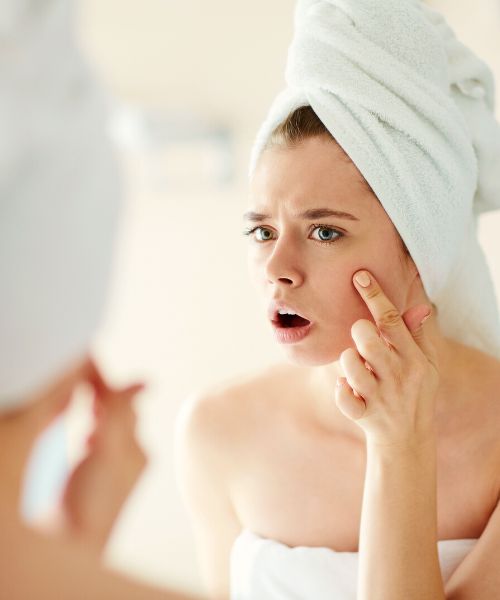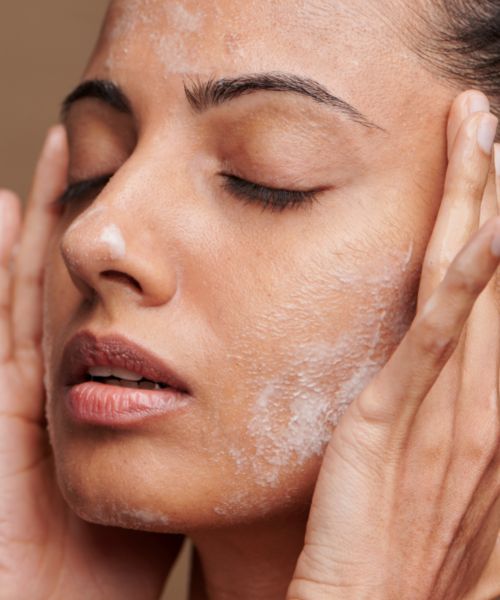Due to various external and internal factors, the skin can become dehydrated at any point in our lives, and unfortunately, this condition brings with it a whole array of issues.
Suddenly, our skin feels tighter, drier, and irritated and is more prone to breakouts. Essentially, when the skin lacks moisture, it starts to freak out and can’t function as efficiently as it usually would.
So, how can we fix dehydrated skin prone to acne?
Well, a good starting point would be to understand it better and identify the root of the problem. Once we know that, we can then take steps to address it accordingly.
Therefore, in this article, I’ll discuss dehydrated skin and acne in more detail and provide some solutions to the problem.

What is Dehydrated Skin?
Dehydrated skin is a temporary skin condition that occurs when the skin loses more water than it can retain. It happens to everyone at some point and is usually caused by external factors like weather, lifestyle choices, and skincare products.
Dehydrated skin can feel tight, dry, and itchy and can sometimes peel or shed due to the lack of moisture.
You can recognize dehydrated skin by several common symptoms that include:
- Sunken eyes and dark under eyes.
- Dull, sallow, or yellowish complexion.
- Rough skin texture.
- Prominent lines and wrinkles.
- Visibly enlarged pores.
- Bumps and blemishes such as closed comedones.
- Inflamed pimples.
How is Dehydrated Skin Different Than Dry Skin?
Dehydrated skin can appear dry, but these two are not the same.
Dehydrated skin is different than dry skin because it is a skin condition, while dry skin is a genetically determined skin type.
Additionally, the main difference between the two, even though they often show similar symptoms, is that dehydrated skin lacks moisture, or water, while dry skin lacks sebum or oil.
You’re likely dealing with dry skin if you’re noticing the following:
- Skin tightness (especially after showering.)
- Skin that normally feels stretched and looks rough.
- Redness.
- Flaking or peeling.
Dry skin can sometimes come along with other skin conditions, including psoriasis, eczema, or dermatitis, while dehydrated skin usually brings acne and rosacea.
Why is Dehydrated Skin More Prone to Acne?

Dehydrated skin is a condition that can be caused by various external factors, including weather, lifestyle choices, and the use of certain skincare products, especially those that contain ingredients that can strip the skin of its natural oil.
Now, as I already mentioned above, dehydrated skin is a condition characterized by a lack of water, so why am I now mentioning oil?
It’s because our skin needs its natural oil to create a barrier that will prevent water loss. So, when the skin is stripped of its oil, it becomes more susceptible to water loss and, as a result, more prone to dehydration.
Additionally, when the skin is dehydrated, it’s more likely to produce excess oil in an attempt to compensate for the lack of moisture.
This will then lead to clogged pores because the excess oil will mix with dead skin cells and cellular debris inside the pores and create the perfect environment for bacteria to grow and thrive.
This overgrowth of bacteria will then trigger the immune system to release inflammatory compounds to fight the infection, which will cause the redness, swelling, and pain you see on the skin as pimples.
And this is why dehydrated skin is more prone to developing acne.
Additionally, the issue doesn’t stop there because most ingredients in products formulated to fight acne are also drying, so they can potentially make the problem worse by damaging your skin barrier and making it unable to hang on to moisture.
This dehydration can further cause inflammation on the skin, leading to more breakouts and continuing the vicious cycle until you find the right way to fix the dehydration.
6 Ways to Fix Dehydrated Acne-Prone Skin

Dehydrated, acne-prone skin doesn’t happen overnight, which is why it also can’t be fixed overnight.
These two concerns require a multi-pronged approach that should include both lifestyle changes and the use of skincare products that will help support your skin’s barrier function.
Additionally, improvement also requires patience and consistency, as it can take weeks or even months to fix the dehydration entirely and see a significant improvement in your skin’s condition.
Here are some of the things you can do to fix dehydrated, acne-prone skin:
Wash With A Gentle Cleanser & Lukewarm Water
A gentle cleanser that doesn’t strip the skin of its natural oil is crucial for fixing dehydrated skin.
Besides not containing harsh, irritating, and drying ingredients like fragrance and alcohol, also make sure that your cleanser isn’t very foamy and has more of a lather consistency when in contact with water rather than producing a lot of bubbles.
Additionally, when cleansing your face, always use lukewarm water rather than hot water, as the latter can further damage your skin barrier.
Lastly, while cleansing your skin twice a day is usually recommended, dehydrated skin can make do with just once a day because washing your face too often can further dehydrate the skin.
Apply a Hydrating Toner
Toners are not necessary in a regular skincare routine; however, they can be helpful in providing an extra layer of hydration when your skin is dehydrated.
However, make sure that your toners don’t contain drying alcohol, irritating fragrance, or exfoliating acids.
You want something gentle that contains hydrating ingredients like hyaluronic acid and glycerin, with the addition of soothing components like green tea and chamomile extracts to calm irritation and reduce redness.
Apply a Hydrating Serum
If you decide to skip the toner, make sure you’re using a hydrating serum as part of your skincare routine.
Serums are excellent for delivering a high concentration of active ingredients to the skin because they have smaller molecules that can penetrate deeper.
So, look for serums that contain hydrating and soothing ingredients instead of those that contain aggressive actives like exfoliating acids, melanin-inhibiting agents, and drying alcohols.
Also, apply your serum while your skin is still damp from either your toner or just washing your face with water to help lock in the hydration.
Use a Gentle Exfoliant
An exfoliant is not necessarily something you want to go heavy on when your skin is dehydrated; however, these can help keep acne under control while you’re working on fixing your skin barrier.
So, instead of exfoliating 2-3 times a week, do this as a part of your evening routine once or twice a week.
Additionally, make sure to use an exfoliating product with a low concentration of gentle acids that will help unclog pores and keep the overgrowth of bacteria in check.
Apply a Barrier-Repairing Moisturizer
Barrier-repairing moisturizers that contain ingredients like ceramides, fatty acids, and soothing components are vital for fixing dehydrated skin.
These ingredients help replenish the skin’s natural lipid levels, thus strengthening the skin’s barrier and preventing moisture loss.
The soothing ingredients further help reduce irritation caused by dehydration and inflamed pimples.
Protect Your Skin with Sunscreen
Finally, and most importantly, always remember to apply sunscreen during the day, regardless of whether you stay indoors or go outside.
Not only does sunscreen protect your skin from the harmful UV rays that can cause sun damage, but it also forms a protective barrier on the skin that helps lock in hydration and prevent various pathogens from coming into contact with your skin.
So, make sure to choose a sunscreen that doesn’t contain drying alcohols or irritating fragrances and has a minimum SPF of 30.
5 Things to Avoid if You Have Dehydrated Acne-Prone Skin

On the other hand, there are certain ingredients, products, and lifestyle habits that you want to avoid while healing your dehydrated acne-prone skin.
Here are some of them:
Drying Skincare Products
Skincare products that contain irritating and drying ingredients like fragrance and alcohol or are high on the pH scale, like soap, can further damage your skin barrier and make it difficult for your skin to retain moisture.
Instead, look for products formulated with hydrating and barrier-repairing ingredients that will nourish and strengthen your skin.
Aggressive Skincare Products
Having dehydrated skin isn’t a time for rough scrubs or aggressive actives like exfoliating acids, retinoids, or melanin inhibitors like vitamin C, kojic acid, or hydroquinone.
These aren’t necessarily bad, and there’s nothing wrong with using these actives to address various skin concerns; however, if you’re using them while your skin is already dehydrated, you’re just going to end up exacerbating the problem.
Hot Water
Hot, scorching water strips the skin of its natural oil, leaving it dry, tight, and irritated.
And as I already mentioned above, when the skin is stripped of its natural oil, it becomes more susceptible to water loss and, as a result, more prone to dehydration.
Certain Foods
Certain processed foods, like pastries, candy, cereal, etc., can cause dehydration and a spike in insulin levels, triggering inflammation and exacerbating acne.
Additionally, drinks like alcohol and caffeine can also lead to dehydration, so it’s best to limit your intake if you’re trying to clear up your skin.
Unhealthy Life Habits
Stress, not sleeping enough, smoking, etc., are just a few unhealthy life habits that can worsen dehydration and acne.
For example, smoking has been shown to exacerbate acne by activating acetylcholine, a chemical messenger that stimulates the sebaceous glands into producing excess oil and is directly affected by nicotine.
Stress and not sleeping enough, on the other hand, can actually weaken the skin barrier, making it more susceptible to inflammation and infection.

My name is Simone and I am a certified skin specialist. I created this website to teach my readers how to take great care of their skin and I also like to occasionally share my honest opinions on skincare products I’ve tried. You can learn more about me here.
